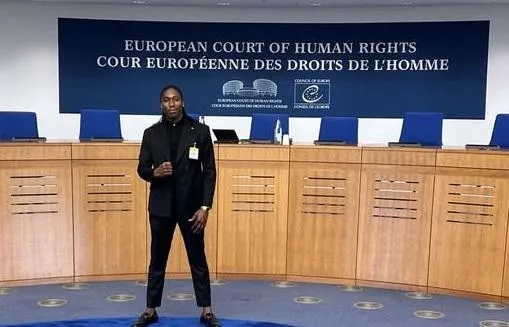
Victory as Caster Semenya jumps over a hurdle in a landmark ruling in Switzerland.
Image: Caster Semenya
The European Court of Human Rights (ECHR) has found that South African Olympian Caster Semenya was denied a fair trial by Switzerland’s legal system, marking a significant milestone in her ongoing legal battle against regulations requiring athletes with differences of sex development (DSD) to medically alter their natural hormone levels to compete.
In a Grand Chamber judgment delivered on Thursday, the court ruled by 15 votes to two that the Swiss Federal Supreme Court failed to conduct a sufficiently rigorous review of Semenya’s appeal against the 2019 decision by the Court of Arbitration for Sport (CAS), which had upheld World Athletics' so-called “DSD Regulations”.
These rules compel female athletes with naturally high testosterone levels to undergo hormone suppression therapy to compete in certain events.
The court found that Switzerland had violated Semenya’s rights under Article 6(1) of the European Convention on Human Rights, which guarantees the right to a fair hearing.
The court awarded Semenya €80,000 (about R1.6 million) for legal costs, though she had not sought damages.

Victory as Caster Semenya jumps over a hurdle in a landmark ruling in Switzerland.
Image: Facebook / Caster Semenya
The decision does not directly overturn the DSD regulations but opens the way for further legal challenge and scrutiny of how national courts handle arbitration decisions involving fundamental human rights.
Responding to the outcome, Professor Tshepo Madlingozi of the South African Human Rights Commission, which was an intervening party in the case, said the decision affirms that “sportspeople are not outside the scope of human rights”.
Reacting to the judgment, Semenya said: “I have waited 15 long years for this judgment. Today, my patience in this journey has been rewarded with a result that will pave the way for all athletes’ human rights to be protected. I have given up what I wanted in the hope that others may have what they need. I hope this victory will inspire young women to be and to accept themselves in all their diversity.”
Her lawyer, Gregory Nott of Norton Rose Fulbright South Africa, called it “a resounding victory not only for Caster but for the principles of equality, fairness, and bodily autonomy in international sport”.
"It is a reminder that all sportspeople are entitled to fundamental human rights," he said.
Semenya, a two-time Olympic gold medallist in the 800 metres, has not been able to compete in her signature events for several years due to the DSD rules.
Cape Argus
Related Topics: